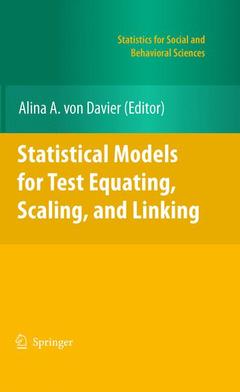Statistical Models for Test Equating, Scaling, and Linking, 2011 Statistics for Social and Behavioral Sciences Series
Coordonnateur : von Davier Alina

The book contributes to establishing ?equating? as a theoretical field, a view that has not been offered often before. The tradition in the practice of equating has been to present the knowledge and skills needed as a craft, which implies that only with years of experience under the guidance of a knowledgeable practitioner could one acquire the required skills. This book challenges this view by indicating how a good equating framework, a sound understanding of the assumptions that underlie the psychometric models, and the use of statistical tests and statistical process control tools can help the practitioner navigate the difficult decisions in choosing the final equating function.
This book provides a valuable reference for several groups: (a) statisticians and psychometricians interested in the theory behind equating methods, in the use of model-based statistical methods for data smoothing, and in the evaluation of the equating results in applied work; (b) practitioners who need to equate tests, including those with these responsibilities in testing companies, state testing agencies, and school districts; and (c) instructors in psychometric, measurement, and psychology programs.
Winner of the 2013 Division D Significant Contribution to Educational Measurement and Research Methodology award
Approaches equating as a theoretical field.
Emphasizes good equating theory and practice, and sound understanding of underlying assumptions
Challenges the traditional view that only years of apprenticeship to a seasoned practitioner can one master equating
Will be a good reference for students and researchers from psychometrics and statistics as well as those in educational measurement
Includes supplementary material: sn.pub/extras
Date de parution : 10-2010
Ouvrage de 368 p.
15.5x23.5 cm
Disponible chez l'éditeur (délai d'approvisionnement : 15 jours).
Prix indicatif 126,59 €
Ajouter au panierDate de parution : 12-2012
Ouvrage de 368 p.
15.5x23.5 cm
Disponible chez l'éditeur (délai d'approvisionnement : 15 jours).
Prix indicatif 89,66 €
Ajouter au panierMots-clés :
Measurement Model; Psychometric Model; Standardized Assessment; Test Equating



